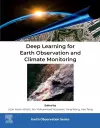
Deep Learning for Earth Observation and Climate Monitoring
4 contributors - Paperback
£124.20 was £138.00
Uzair Aslam Bhatti is mostly active in the application and development of machine learning in signal processing problems, especially to the application of artificial intelligence in other fields. During his PhD studies at Hainan University, he won 2 Best Research Paper Awards and a Chinese Government Scholarship to pursue a doctorate. During his Post Doc at the School of Geography (Remote Sensing and Signal Processing) of Nanjing Normal University, he published 11 research papers as the first author in two years as the first author, 2 of which were published in the top SCI journals Transactions in Geoscience and Remote Sensing and Chemosphere. Due to the publication of 2 conference papers at CCF B-level conferences and 10 SCI papers as the first author, he was declared an excellent postdoctoral candidate by Nanjing Normal University. He has participated in many projects such as the National Natural Science Foundation of China, the National Key R&D Program, and the Hainan Provincial Major Science and Technology Program. Mir Muhammad Nizamani’s research focuses on deep understanding of fundamental ecological principles and methods as well as their applications to current human and urban issues. He has published nearly 60 academic papers and won a Chinese Government Scholarship to pursue a doctorate during his Ph.D. studies at Hainan University. He has participated in many external projects, such as the National Natural Science Foundation of China and the National Science Foundation of Hainan Province. Yong Wang is a professor at Guizhou University, specializing in ecology and mycology. His research interests encompass a broad range of topics within these fields. As an ecologist, he investigates the relationships between organisms and their environment, studying how living organisms interact with each other and their surrounding ecosystems. With his expertise in ecology and mycology, Professor Yong Wang has contributed to the understanding of the ecological dynamics and functions of fungi, their role in nutrient cycling, symbiotic relationships with other organisms, or the effects of environmental factors on fungal communities. His research findings can help inform conservation efforts, promote sustainable practices, and contribute to the broader scientific knowledge in these fields. Hao Tang is a Lecturer with the School of Information and Communication Engineering, Hainan University after receiving his Ph.D. degree in mechanical engineering from South China University of Technology, Guangzhou City, Guangdong Province, China, in 2021. His research interests include intelligent manufacturing, industrial big data, scheduling and embedded systems.